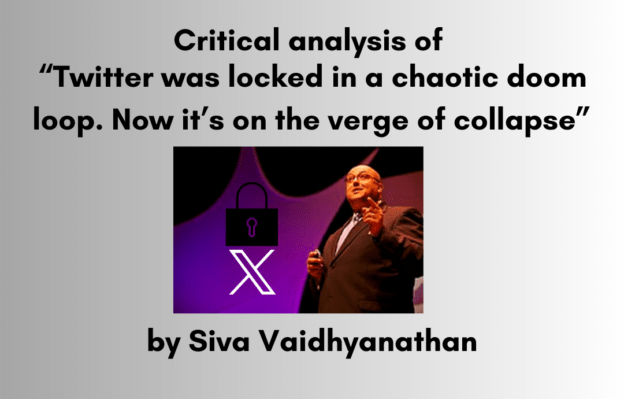The article “Twitter was locked in a chaotic doom loop. Now it’s on the verge of collapse” by Siva Vaidhyanathan is, according to The Guardian, “already” two months old. It ascertains that X/Twitter’s financial/technical/moral collapse is “just around the corner” but this does not seem to be happening any time soon. Join me in an exploration and critical analysis of the article.
Introduction
In an era where social media platforms constantly undergo transformations and critiques, Elon Musk’s acquisition and subsequent management of Twitter have generated significant attention. An article from The Guardian by Siva Vaidhyanathan delves into this matter, casting a scrutinizing eye on the decisions made under Musk’s leadership. As with any critical perspective, it’s essential to dissect the assertions and arguments presented to gain a comprehensive understanding of their merits and potential shortcomings.
Contents
Précis of the Original Article
Siva Vaidhyanathan’s article in The Guardian critiques Elon Musk’s management of Twitter since its acquisition. The piece touches upon multiple issues users faced, including the platform’s recent meltdown, decisions like limiting tweet access due to alleged data scraping concerns, and the introduction of the Twitter Blue service. Vaidhyanathan asserts that Musk’s decisions reflect incompetence, especially as they alienate loyal user bases and advertisers. The writer laments how Twitter, once a hub for serious conversations and breaking news, has deteriorated under Musk, leading to staff layoffs and reduced service quality. Drawing a parallel between Musk’s handling of Twitter and Donald Trump’s approach to the US government, the article suggests a lack of strategic vision on Musk’s part. With financial concerns highlighted, the article predicts a bleak future for Twitter under its current leadership.
Critical Analysis
The article presents a very critical view of Elon Musk’s management of Twitter after he acquired it. While there might be elements of truth in its concerns about the platform’s decisions and directions, a thorough critical analysis will reveal certain weaknesses in its arguments and assertions. Here are the key points:
Speculation and Assumptions
The article makes several speculations without substantial evidence. For instance, it asserts that Musk did not run any predictive analyses to come up with his policies. This is an assumption that might not necessarily be accurate.
Emotional Language
The use of terms like “former genius”, “violent and oppressive government of Saudi Arabia”, and “white supremacists like Tucker Carlson” reflect a tone that is more emotional than objective, which could potentially make readers question the impartiality of the writer.
Comparative Critique
Comparing Elon Musk’s management of Twitter to how “Donald Trump ran the US government” is a significant stretch. Such comparisons, especially without a deep exploration of their complexities, can be seen as an oversimplification and a tactic to appeal to readers’ emotions.
Generalizations
The article mentions that Twitter is “solely the refuge of white supremacists like Tucker Carlson.” This is a sweeping generalization that doesn’t acknowledge the millions of diverse users on the platform.
Overemphasis on Negative Changes
While it’s important to address the issues on the platform, the article focuses solely on the negative impacts without acknowledging any potential positive changes or reasons behind those changes.
Predictions Without Basis
The writer predicts Twitter’s impending collapse without offering a substantial basis for this claim. The sentence, “Of course, I’ve been saying that for a year now, and I have no special insight into its financial matters” highlights this point.
Bias against Social Media technologies and platforms
The credentials of the writer at the end indicate that he has written books critical of social media. This could indicate a certain predisposition or bias against platforms like Twitter, which might have influenced the tone and angle of the article.
Causation vs. Correlation
While the article does list a series of issues that have arisen under Musk’s management, it doesn’t necessarily establish a direct causation between Musk’s decisions and all of Twitter’s challenges. Correlation does not imply causation.
Failure to Address Broader Context
The article doesn’t address the broader challenges facing social media platforms in general or the dynamics of the tech industry that might be affecting Twitter.
Conclusion
In conclusion, while there may be valid critiques of Elon Musk’s management of X/Twitter, the article presents its arguments in a manner that leans heavily on emotional language, assumptions, and generalizations. A more balanced and evidence-based analysis would offer a clearer picture of the situation.
Assessing the criticisms of Elon Musk’s handling of Twitter, one cannot help but notice a blend of valid concerns intertwined with strong personal sentiments. The article in question provides valuable insights into some of the platform’s challenges. However, the degree of emotion, speculation, and sweeping generalizations in the arguments potentially dilutes the strength of the critique. As with any analysis, approaching such critiques with a discerning eye and seeking a holistic perspective, including potential positive developments and broader industry dynamics, is crucial.
